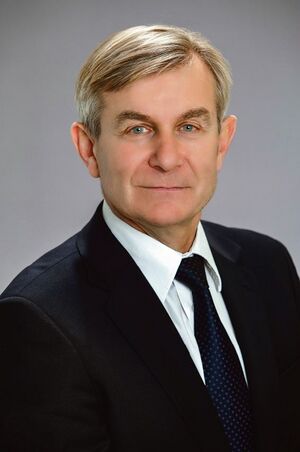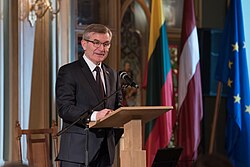Simas Nekrošius
Simas Nekrošius | |
|---|---|
 | |
| Minister of Social Affairs and Employment | |
| Assumed office 28 June 2019 | |
| Chancellor | Otto von Hößlin |
| Preceded by | Adolf Grönsfelder |
| Personal details | |
| Born | 13 December 1957 Šilokrautė, Ruttland, Werania |
| Political party | DA (2010-present) SDT (1986-2010) SDRP-DS (1982-1985) DS (1977-1982) |
| Spouse | Jadvyga Valinskienė |
| Alma mater | University of Lipliškės Šilokrautė University |
| Military career | |
| Allegiance | |
| Service/ | Army |
Simas Nekrošius (born 13 December 1957) is a Ruttish-Weranian politician and former presenter who is the incumbent Minister of Social Affairs and Employment and a member of the Volkstag since the 2007 general election originally being elected as a member of the Sotirian Democratic Homeland (SDT) before switching to the Democratic Alternative (DA) prior to the 2011 general election.
Prior to his career in politics Nekrošius was a journalist as well as a television presenter, being a opinion writer for the centre-right paper Tageskorrespondent. He later became the host of RFO's Political Review television show from 2002-2006 and garnered a reputation of being an incisive interviewer.
In 2007 Nekrošius announced he was stepping down as host of Political Review in order to run for a seat in the Volkstag on a SDT ticket, being elected in his native Ruttland. He was one of the few SDT representatives to vote against a coalition government with Rasa Šalaševičiūtė and in 2010 left the party to join the Democratic Alternative. Nekrošius was re-elected in 2011, 2015 and 2019 whilst continuing to write opinion pieces in the Tageskorrespondent. In 2019 he was appointed as Minister of Social Affairs and Employment in the NKP-DA coalition government leading to him to retire from writing in the Tageskrorrespondent.
Early life and education
Nekrošius was born in Šilokrautė in Ruttland to a single mother in 1957. An only child Nekrošius never met his father whilst his mother worked as a typist. Up until the age of seven he was raised by his grandparents - his grandfather Jonas Nekrošius was an electrician and left-wing trade union activist, being a member of the Ruttish Section of the Workers' International. Nekrošius described his early childhood as being tough but instilled in him the principles of hard work and ingenuity. In 1965 his mother re-married to a paper salesman leading to Nekrošius to move with his new family to Lipliškės and in 1967 his half-sister was born.
In 1975 Nekrošius left school to serve in the Weranian Army as part of his national service serving in the infantry. In 1977 Nekrošius exited the army to go to university after passing examinations, attending the University of Lipliškės studying business, graduating in 1981 with a bachelors degree in Business Management. After leaving university Nekrošius worked as a marketing manager for a construction company whilst undertaking a post-graduate course in journalism at Šilokrautė University.
From 1977 to 1985 Nekrošius was a member of the Ruttish Labour Union (DS) and its successor organisation the Social Democratic Radical Party-Labour Union (SDRP-DS). He left the party in 1985 due to opposition to the SDRP-DS's economic policies after re-entering government in 1984. He subsequently joined the Sotirian Democratic Homeland albeit his membership was during the 1980's largely inactive.
Media career
In 1984 Nekrošius was hired for the daily Ruttish paper the Tribune (Tribūna) working as its business correspondent. He left the paper in 1987 after being hired as the Euclean reporter for the larger Weranian paper the Tageskorrespondent. At the Tageskorrespondent Nekrošius garnered a reputation for sharp criticism of the Euclean Community (referring to the organisation as being a "Gaullican Empire if war crimes were substituted for insurmountable bureaucracy") and the Weranian government under Ludolf Ostermann and Wolfgang Löscher. With his columns becoming popular in 1996 the Tageskorrespondent gave him a opinion column in their Ruttish and Weranic language papers.
In 1999 Nekrošius was one of the few right-wing commentators not to endorse the NKP at the federal election that year, instead urging for a vote for the SDT in Ruttland and the Democratic Alternative (DA) in the rest of Werania. According to Nekrošius this would ensure that a NKP government would "appeal to the right rather then the left". During this period he often appeared as a guest interviewee on political talk shows articulating right-wing causes.
In 2002 Nekrošius was hired by public broadcaster RFO as the host of Political Review. His appointment to the show, considered one of RFO's flagship political commentary shows, attracted controversy due to Nekrošius's right-wing views. RFO chairman Kurt von Westphalen defended the choice saying that Nekrošius was an "effective interviewer and sharp political mind" and that all RFO employees are required to be non-partisan in their RFO activities, a fact Nekrošius was "very well aware of". Nekrošius himself said he would endeavour to be non-biased in his presentation and added that the "common public knowledge of my political views means viewers will easily be able to tell if any bias comes through".
As the Political Review host Nekrošius gained a reputation for his incisive interviewing style. In 2006 Nekrošius announced he would step down as the host of the Political Review in order to get involved in active politics, stating he was exploring the possibility of running for a seat in the Volkstag on a SDT ticket. Nekrošius continued however to write for the Tageskorrespondent.
Political career
Nekrošius was officially picked as a SDT candidate for the city of Šilokrautė in November 2006 in preparation for the 2007 federal election. He stated that he would defend Sotirian democratic values and ensure a strong voice for Ruttland. He was elected in the election which saw the SDT increase its representation from 10 seats to 17.
Volkstag member
When the SDT announced that they would enter a coalition government with the National Consolidation Party and the Ecological Reformists Nekrošius voiced his personal opposition to the proposal, stating the government of Rasa Šalaševičiūtė had not implemented sufficient policies of fiscal discipline. He however voted in confidence for the government stating that he did so placing national duty above personal opinions. Nekrošius however refused to be involved in government preferring to be backbencher that would "hold the government to account when necessary".
In 2009 Nekrošius called for Foreign Minister and Ecological Reformist leader Theodore Goetzberger to resign over a conflict of interests scandal, stating Goetzberger's links to various Euclean businesses meant he was "unfit for public office and undermining public confidence in politics." This stance was criticised by some of his colleagues as damaging the government from within.
In 2010 Nekrošius left the SDT to join the Democratic Alternative after expressing "frustration" with the government, stating that it was "tired, unresponsive and unwilling to undertake meaningful policy reforms and instead simply wishing to remain for the sake of power". Nekrošius stated that the DA represented the best prospects for conservatives in the country, being welcomed into the party thanks to his right-wing credentials. In 2011 he was re-elected to the Volkstag, the only DA member to be elected in Ruttland.
Nekrošius in 2012 voted against legalising same-sex marriage. He remained a critic of the government on foreign and fiscal policy, accusing the SRPO of "chasing headlines" rather then taking serious action on ensuring fiscal discipline. Nekrošius was re-elected in 2015 and became one of the DA's primary spokesmen on fiscal affairs. He stated that the elimination of the deficit in 2016 was the result of "smoke and mirrors" and that the government had failed to establish an economic foundation that would maintain a balanced budget.
Minister of Social Affairs and Employment
Following the 2019 general election the SRPO-PMZ-SDT lost power as the NKP became the largest party. In June 2019 the NKP and DA agreed to form a coalition with Nekrošius being proposed as Minister of Social Affairs and Employment, managing the country's welfare system. His appointment was controversial as Nekrošius had previously referred to the welfare system as "socialist nonsense" - however following his appointment he assured the Volkstag that he intended to maintain the welfare system's coverage whilst making it more fiscally secure and efficient.
In October 2019 three new welfare laws were proposed. The first established a new welfare scheme for families in order to encourage large families. The the new scheme, named the Family First Initiative, proposed that families receive a tax-free benefit of €150 per month for the second and any consecutive children until they reach the age of 18. Families are also eligible to receive the benefit for their first child if the family income is under €200 per family member. The Family First Initiative will also apply to all children, not just those born after the introduction of the programme. The second centralised welfare fraud agencies under the Ministry and introduced work capability tests in order to determine those eligible for welfare. The last removed much of the eligibility of non-EC citizens to apply for welfare with the requirement to apply for any kind of welfare for foreigners being raised from 2 years of work to 5 for non-married couples and 4 for married. Foreigners also have to have a clean criminal record to apply for welfare and "appropriate" paperwork. Nekrošius defended the proposals by stating that the proposals "simplify the welfare system whilst increasing its reach in various areas and stripping it back especially for those who can work and refuse to work".
Political views
Nekrošius has often been described as being a populist conservative, although he has disputed the use of the former term. Nekrošius has described himself as being supportive of laissez-faire economics, anti-immigration and hard Euclospectism.
In 2006 Nekrošius called for the privatisation of the Weranic welfare system, calling the existing structure "socialist nonsense". He also called for health and education systems to be restructured to be made more competitive and profitable in order to maximise efficiency and innovation. Following his appointment as Minister of Social Affairs Nekrošius stated that a full privatisation of the welfare system was "untenable" but that he would work towards making it "more targeted, more based on a profit model in order to ensure a shift to a low-welfare, low-tax and high wage economy."
A sharp critic of the Euclean Community Nekrošius has called for the abolition of the Euclo, accusing the currency of "exacerbating financial crisis's as well as limiting the government's fiscal space when responding to financial downturns". He has also stated free-movement is a "backdoor for terrorism and cultural prostitution" and called greater restrictions on immigration within and outside the EC. Nekrošius in 2016 stated if there was a referendum to leave the Euclean Community that he would vote to leave, albeit stressed reform of EC institutions was more important and viable. Upon his appointment as a Minister Nekrošius said he would support the government's Euclean policy provided greater integration was avoided.
Nekrošius has stated he is sceptical that human actions have a noticeable effect on climate change and accused environmentalist activists of attempting "socialism through the backdoor of so-called climate regulations". In 2018 Nekrošius called for money spent on combating climate change to be spent instead on the army.
In 2003 Nekrošius said an independent Ruttland was "preferable" if the Weranic government endorsed closer EC or centralist integration. However in 2012 Nekrošius clarified his stance stating that he would rather Ruttland remain in Werania provided its current autonomy was respected.
Personal life
Nekrošius met his wife, Jadvyga Valinskienė, at the University of Lipliškės with her at the time being a drama student. They married on the 15 March 1978. Nekrošius and Valinskienė have three children and two grandchildren.
